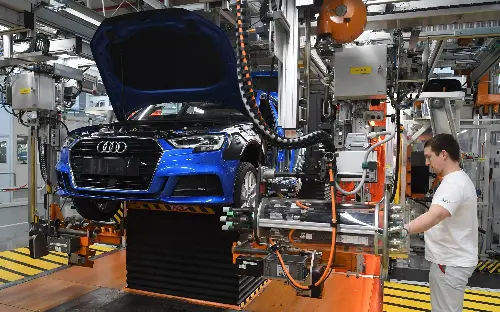
Audi plans to cut 7,500 jobs as the German car maker scrambles to find money to fund the “challenging transition to electric mobility”.
The manufacturer, which is owned by Volkswagen, on Monday announced plans to axe around 8pc of its workforce by 2029. The job cuts are part of a series of measures aimed at saving €1bn (£840m) a year.
Audi said: “The economic conditions are becoming increasingly tougher, competitive pressure and political uncertainties are presenting the company with immense challenges.”
The company, which is headquartered in the Bavarian city of Ingolstadt, said the cuts would be in areas such as administration and development and be carried out in a “socially responsible” manner, meaning there would be no compulsory redundancies. Instead, workers will not be replaced when they retire or leave.
Audi is making the cuts as it scrambles to free up cash to fund the costly transition to electric vehicles (EVs). The company plans to plough about €8bn into its two biggest manufacturing sites, Ingolstadt and Neckarsulm in Germany, as it races to become more efficient at making EVs.
Gernot Döllner, Audi’s chairman, said: “We are setting Ingolstadt and Neckarsulm up to be robust and flexible for the challenging transition to electric mobility.
“Audi must become faster, more agile, and more efficient. One thing is clear: this cannot be done without personnel adjustments. Together, we will match the personnel measures to the scope.”
Carmakers are slashing jobs as the industry struggles with weak demand among customers for EVs but demands by lawmakers across the UK and EU to shift to electric.
Total EV sales across Europe, including the UK, fell by 1.3pc in 2024, according to the European Automobile Manufacturers’ Association.
Audi has been hit hard by slowing EV demand. The carmaker’s deliveries of fully-electric vehicles slid 8pc year-on-year in 2024, to some 164,000. In February it closed a plant making EVs in Belgium that employed about 3,000 people.
Cuts at Audi are the latest in Germany’s auto industry, which has been hit hard by a slower-than-expected shift to electric cars, the loss of cheap Russian fuel and fierce competition from Chinese rivals. Audi’s parent company Volkswagen announced in December it would cut 35,000 jobs at its VW brand in Germany by 2030.
It comes at a difficult time for the German economy, which already shrank 0.2pc last year before the start of an escalating trade war between the US and Europe.
Audi employs about 88,000 people worldwide, including 55,000 in Germany.